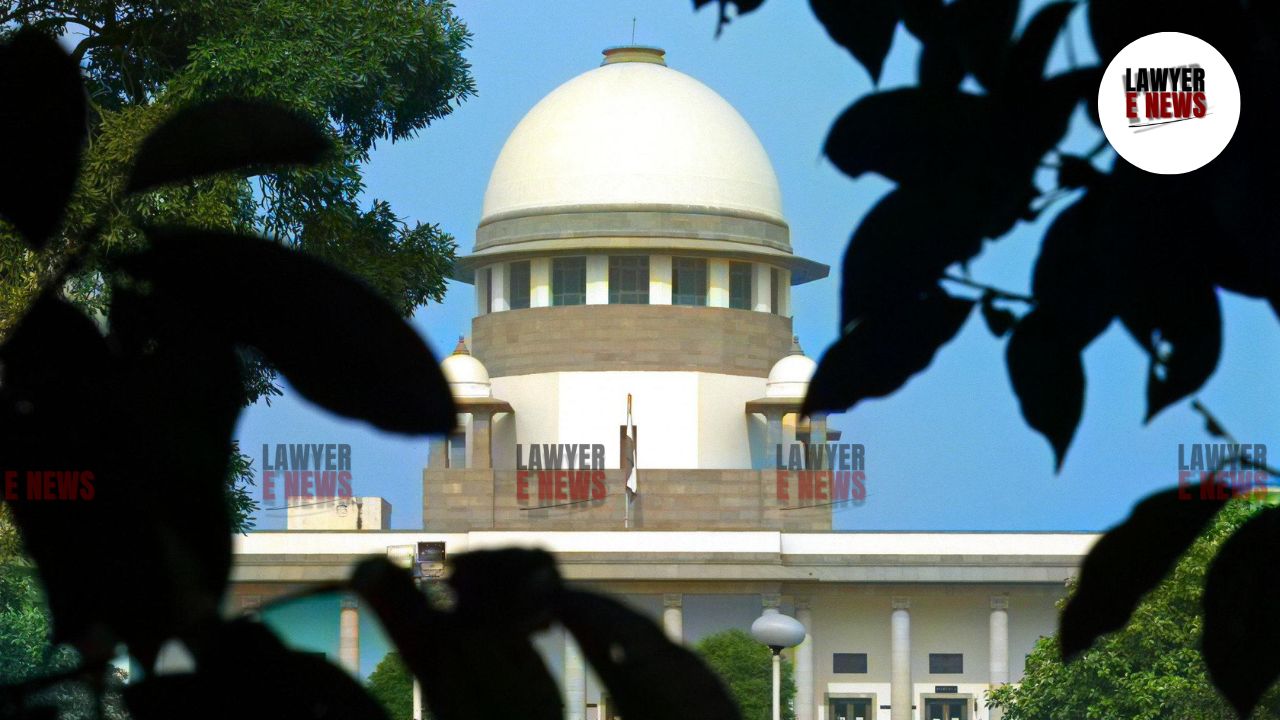-
by Admin
15 February 2026 5:35 AM



Supreme Court of India delivered a significant ruling addressing the bar imposed by Order II Rule 2 of the Code of Civil Procedure (CPC) on subsequent suits based on the same cause of action. The Court held that the second suit for specific performance of a sale agreement and cancellation of a subsequent sale deed was not barred under Order II Rule 2 because the cause of action was distinct from that of the earlier suit for permanent injunction.
In its decision, a Bench comprising Justice J.B. Pardiwala and Justice R. Mahadevan clarified the principles governing Order II Rule 2 CPC, emphasizing the necessity to examine whether the plaintiff was "entitled to" and "able to" claim the relief in the earlier suit. The judgment addressed the interplay of factual circumstances, statutory bars, and subsequent developments, holding that a plaintiff cannot be deprived of reliefs due to circumstances beyond their control at the time of filing the first suit.
"The Entire Plaint Must Be Read Holistically": Key Principle Affirmed
The Supreme Court reiterated that for determining whether a suit is barred under Order II Rule 2, courts must read the plaint as a whole. A few isolated paragraphs or sentences cannot be relied upon to infer identity of the cause of action. "It is the identity of the cause of action, and not merely the similarity in pleadings, that governs the applicability of Order II Rule 2 CPC," the Bench observed.
The case originated from a 2007 agreement for sale entered into by the plaintiff (Respondent No. 1) with Defendant No. 2. The plaintiff paid the entire sale consideration, and a Power of Attorney was executed in its favor for completing formalities related to the sale. However, Defendant No. 2 later revoked the Power of Attorney, returned the consideration amount via demand draft, and sold the property to the appellant (Defendant No. 1).
In February 2008, the plaintiff filed the first suit for permanent injunction, seeking to restrain interference with possession and enjoyment of the property.
During the pendency of this suit, the plaintiff learned about the sale deed executed in favor of the appellant. However, at the time of filing, a Government Order (G.O.) issued in 1986 prohibited the registration of sale deeds in the village where the property was situated, except in favor of a specific company.
This ban was quashed by the Madras High Court in March 2008, after which the plaintiff filed a second suit seeking specific performance of the agreement and cancellation of the sale deed executed in favor of the appellant.
The trial court rejected the second suit under Order VII Rule 11 CPC, holding that the reliefs claimed in the second suit should have been included in the earlier suit, as they arose from the same cause of action. The High Court reversed this decision, prompting the appellant to approach the Supreme Court.
Order II Rule 2 CPC bars subsequent suits based on the same cause of action if the plaintiff:
Fails to include all claims they are entitled to make in the earlier suit.
Intentionally relinquishes claims or reliefs without obtaining leave of the court.
However, the Court clarified that the phrase "entitled to make" implies the relief must be both available and enforceable at the time of filing the earlier suit. A subsequent event giving rise to a new claim or cause of action would not attract the bar under Order II Rule 2 CPC.
Citing precedents such as Saleem Bhai v. State of Maharashtra [(2003) 1 SCC 557] and Ram Prakash Gupta v. Rajiv Kumar Gupta [(2007) 10 SCC 59], the Court emphasized that the entire plaint must be read to ascertain whether the causes of action in two suits are identical. A few paragraphs cannot be read in isolation.
“It would be incorrect to hold that merely because the pleadings in the two suits are similar, the causes of action are also identical,” the Court observed.
The Court highlighted that in this case, the 1986 G.O. imposed a mandatory prohibition on registering sale deeds in favor of anyone other than the appellant company. This prohibition rendered it impossible for the plaintiff to seek specific performance or cancellation of the sale deed at the time of filing the first suit.
It was only after the Madras High Court quashed the G.O. in March 2008 that the plaintiff's right to seek specific performance became "available" in law. The Court held:
“The ban prevented the plaintiff from obtaining a title to the property. The quashing of the G.O. crystallized the plaintiff’s rights and gave rise to a new cause of action.”
The Court distinguished the present case from Virgo Industries v. Venturetech Solutions [(2013) 1 SCC 625], where the relief of specific performance was found to be available to the plaintiff at the time of filing the earlier suit. In the present case, the relief was impossible to obtain due to the State-imposed ban.
The Bench cautioned against a technical interpretation of Order II Rule 2 CPC that would deprive plaintiffs of reliefs due to circumstances beyond their control. The Court observed:
“Order II Rule 2 CPC does not require that a plaintiff must claim all reliefs to which they are entitled if it is impossible to obtain those reliefs at the relevant time.”
The Supreme Court upheld the High Court’s decision restoring the second suit for specific performance, holding that:
The causes of action in the two suits were not identical, and
The bar under Order II Rule 2 CPC was inapplicable.
The appeals were dismissed, with the Court directing the trial court to adjudicate both suits on their merits within six months.
Date of Decision: January 15, 2025
